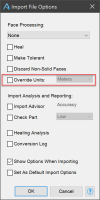Oops, I was wrong, but it still seems to make the same sort of sense. Assemblies can be in non-cm units if they were imported. This is what I've found from testing:
Assembly (inch)
├── Part1 (inch)
└── Part2 (mm)
The WorldTransform for Part1 has:
- No scaling because it's scaling from inch to inch.
- Translations in inch because the root assembly is inch.
The WorldTransform for Part2 has:
- Scaling of 1/25.4 because it's scaling mm to inch.
- Translations in inch because the root assembly is inch.
In all cases, the STEP file for a part is exported the correct size and doesn't require any scaling.

